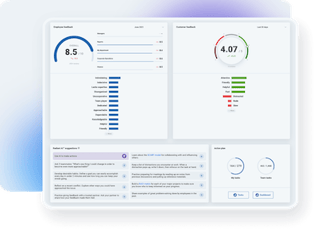
Top Mistakes Managers Make When Asking for Employee Feedback
Often, the focus of employee feedback is on delivering feedback to employees, but managers must also ask for feedback. Asking for employee feedback not only helps uncover the truth of employee experiences at work, but it also helps identify problem areas regarding team dynamics, leadership, and engagement.
Considering that two-thirds of U.S. employees are not engaged, it’s important to gather all the feedback you can to build an understanding of how to turn the tide. However, asking for feedback without a strategy can backfire, preventing employees from giving the input you want and need. Here are some of the top mistakes managers make when asking for employee feedback, and how to avoid them:
Asking Poor Questions
To receive meaningful feedback, you need to ask the right questions. For example, if you want to know whether employees are receiving the support they need from their team, it’s important to ask relevant, open-ended questions that get to the heart of their team experience. When asking for feedback, it’s also important to give employees the space and opportunity to follow their answers with explanations, details, and comments. Asking the wrong kinds of questions will yield only poor or misleading answers. Examples of the kinds of questions to avoid when asking for employee feedback include:
- Closed-ended questions: By asking, “Do you like your team?” you will elicit only a yes/no response and miss out on important details.
- Indirect questions: By asking, “How does your team compare to others?” you will receive opinions about other teams, when what you really want to know about is employee experiences within their own team.
- Leading questions: By asking, “What’s the one thing you think your team should do to make it even better than it already is?” you assume that the employee agrees that their team is great.
Prohibiting Anonymous Feedback
Without anonymity, employees might clam up and attempt to give the feedback they believe their managers want to hear. Worse, many employees will give no feedback at all because they think it might come back to haunt them. No one wants to feel the pressure of having to give feedback that they fear will impact their employment or chances for growth. Those fears may be real or imagined, but they shouldn’t be ignored. Conducting focus groups and putting up a suggestion box are good ways to gather anonymous employee feedback. An employee survey software solution provides the most secure way to solicit and deliver anonymous feedback. Powered by data collection technology, employee survey software offers employees reassurance that their responses can’t be traced back to them. Survey software is also an effective solution because it delivers the feedback only after receiving a certain number of responses.
Asking for Feedback Selectively
It may be tempting for a manager to think they can get all the feedback they need by talking to certain members of the team, assuming that those individuals “get it” better than others. However, by selectively asking for employee feedback, managers miss out on valuable insights from the whole team and run the risk of getting only half the story. Understanding employee experiences and engagement can come only by asking every member of the team for feedback. By understanding everyone’s experiences, you get a complete view of the organization. In addition, asking for feedback from everyone helps allay feelings of favoritism or bias, both of which can negatively impact engagement.
Failing to Follow Through on the Feedback
Asking for feedback implies an intent to take some kind of action based on it. If you ask for feedback and don’t follow through with action, employees will eventually become disinterested in responding the next time you ask. Conversely, follow-up to feedback can deliver positive results in the workplace, not just for employee engagement but also in other areas such as turnover. A CareerBuilder survey found that 48 percent of employees would be more likely to stay with a company that asks them for feedback and puts the feedback into action. Employees need to know that their voices are heard and that there is a commitment to making necessary improvements. When there’s a demonstrated commitment to act, there’s also a greater likelihood that employees will continue to provide feedback.
Asking for feedback is necessary for understanding what employees need for an engaging, productive work life. Asking quality questions that are direct, objective, and posed in an anonymous environment ensures managers get the feedback they need to take meaningful action.






